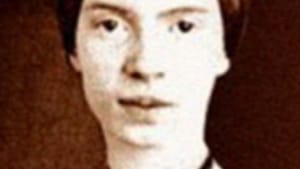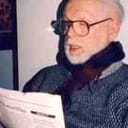Stay in the Loop
BSR publishes on a weekly schedule, with an email newsletter every Wednesday and Thursday morning. There’s no paywall, and subscribing is always free.
My night with Emily Dickinson, and other adventures in poetry
My wild adventures in poetry

We future-obsessed Americans have a hard time paying attention to our usable pasts. An encouraging exception to this mindlessness is Poetry Magazine's year-long celebration of its founding in Chicago in 1912.
Courtesy of a $200 million grant from the drug heiress Ruth Lilly, this centennial is aspiring to a nationwide reach.
In my case, poetry's usable past began when Ezra Pound's mother couldn't stand the cultural vacantness of Hailey, Idaho Territory. So she took her 18-month-old baby to Jenkintown, outside Philadelphia. Pound's urge to become a poet bloomed early in the Quaker-run "dame schools" he attended. His first published poem was a limerick praising the populist politician William Jennings Bryan in 1896:
"There was a young man from the West/ He did what he could for what he thought was the best." He was 11! With plenty of room to improve.
Pound entered Penn at 15, perfecting his idiosyncratic style bit by bit. He was described as "clever, independent minded, conceited, and unpopular." Except to one other Penn oddball, Hilda Doolittle, daughter of an astronomy professor, who fell for Pound's odd line and would eventually be dubbed "H.D. The Imagist," after she followed Pound to London (where she refused his offer of marriage in deference to her skeptical father).
Ezra blew his Penn dissertation on the plays of Lope de Vega. The stiff old school English chair, Felix K. Schelling, didn't dig Pound's class antics and cancelled his fellowship.
Half doctor, half poet
Meanwhile, William Carlos Williams had entered Penn's Medical School with a friendly split personality: half doctor, half poet. He and Ezra plotted the victory of Modernism together. Harriet Monroe would set up shop in Chicago as editor of Poetry, and Ezra would feed her home runs from the likes of T.S. Eliot and James Joyce, not to mention his own buzzing muse.
Once you dip your toes into poetry, it becomes a structural part of your consciousness. Since my own first encounters with Walt Whitman and Emily Dickinson, my life has never been the same.
The first was a lucky fluke. In 1973 I was driving my girl back from celebrating her birthday at Cape May on Walt's birthday (May 31). I was teasing her for having a birthday so close to Walt's when she asked me what his mausoleum in Harleigh Cemetery was like.
At that point I'd lived in Philadelphia for almost 20 years without seeing Walt's tomb. Damn! I made a blind turn off the Walt Whitman Bridge (what else?) to head straight to Harleigh.
The site was a horror. Its 1891 construction was disintegrating. I wondered later if Walt's extemporaneous performances (in his old age he was no longer a great creative poet) discombobulated the masons, whose work was now falling apart.
Graveyard party
Luckily, the National Council of Teacher' of English was holding its annual convention in Philadelphia over that Thanksgiving. (It's what we Am Lit professors call a "remarkable providence.") I wrote the Council's executive committee and asked them if I could walk the aisles with billboards saying on one side "SAVE WALT'S VAULT" and on the other "A BUCK FOR THE BARD'S BONES."
My quirky injunctions raised more than $1,000, if you added Buckminster Fuller's serendipitous last-minute $100 check. (I thanked him for a hundred bucks for the Bard's Bones.) After the mausoleum was repaired, the leftover funds helped finance a "Wake Up To Whitman" 1974 calendar for faculty and students at Beaver College, where I was then teaching.
Duly noted on that calendar was the date for a Grave Yard Party at Harleigh (May 31), at which local poets read their odes to Walt and drank American wine (no fancy French stuff at this U.S. party). Alas, as a tribute to Walt's poem, When Lilacs Last in the Dooryard Bloomed (inspired by Lincoln's assassination), we planted a lilac bush and "blessed" it with a topping-off of the wine. The wine killed the foundling bush.
Emily's birthday ball
I had better luck with Beaver's music chairman Dr. Bill Fabrizio's composition Far Luckier, an allusion to Whitman's poem about Death being far luckier than Life because everyone spent an eternity as leaves of grass. This ceremony was broadcast live over National Public Radio's "All Things Considered."
I had decided to quit classroom teaching and become a global alternative journalist, so I pondered on how to celebrate Emily Dickinson creatively. Back I went to my pal Fabrizio. We decided to hold a Birthday Ball in Beaver's Castle on Emily's 150th birthday— December 10, 1980. Bill even booked Jimmy Dorsey's famous singer, Bob Eberle, to lend a touch of class to our hoopla. (We needed it, since I was to make my first and last appearance as a jazz singer.)
We created a contest for the best couple dressed as lines from a Dickinson poem: First prize was a free, all expenses weekend in Emily's Amherst on Walt's birthday. (Cool!) Second prize, a similar a weekend in Walt's Camden on Emily's birthday. (Not so cool! In fact, too cold.)
Buzzing bees
A lesbian couple won first prize as "buccaneers of buzz" (Emily's image of bees stealing pollen to make their honey). And Bless the Beaver pairs who passed the night reading aloud, all 1,787 of Dickinson's poems.
The verb "to celebrate" stems from the Latin verb "to frequent." America needs more citizens who frequent our great writers and thinkers. Not our boxers or movie stars or millionaires. Our writers. Not because it's better for them (though that's a plus) but good for us. Not solemnly, but happily.
Our literary past is moistly buried. Dig it up. And dig it. Think of 11-year-old Ezra in Jenkintown. And London. And Harriet Monroe in Chicago, publishing the
"H.D." poems that Ezra Pound recommends from London..
It's our past. Go for it.♦
To read a response, click here.
Courtesy of a $200 million grant from the drug heiress Ruth Lilly, this centennial is aspiring to a nationwide reach.
In my case, poetry's usable past began when Ezra Pound's mother couldn't stand the cultural vacantness of Hailey, Idaho Territory. So she took her 18-month-old baby to Jenkintown, outside Philadelphia. Pound's urge to become a poet bloomed early in the Quaker-run "dame schools" he attended. His first published poem was a limerick praising the populist politician William Jennings Bryan in 1896:
"There was a young man from the West/ He did what he could for what he thought was the best." He was 11! With plenty of room to improve.
Pound entered Penn at 15, perfecting his idiosyncratic style bit by bit. He was described as "clever, independent minded, conceited, and unpopular." Except to one other Penn oddball, Hilda Doolittle, daughter of an astronomy professor, who fell for Pound's odd line and would eventually be dubbed "H.D. The Imagist," after she followed Pound to London (where she refused his offer of marriage in deference to her skeptical father).
Ezra blew his Penn dissertation on the plays of Lope de Vega. The stiff old school English chair, Felix K. Schelling, didn't dig Pound's class antics and cancelled his fellowship.
Half doctor, half poet
Meanwhile, William Carlos Williams had entered Penn's Medical School with a friendly split personality: half doctor, half poet. He and Ezra plotted the victory of Modernism together. Harriet Monroe would set up shop in Chicago as editor of Poetry, and Ezra would feed her home runs from the likes of T.S. Eliot and James Joyce, not to mention his own buzzing muse.
Once you dip your toes into poetry, it becomes a structural part of your consciousness. Since my own first encounters with Walt Whitman and Emily Dickinson, my life has never been the same.
The first was a lucky fluke. In 1973 I was driving my girl back from celebrating her birthday at Cape May on Walt's birthday (May 31). I was teasing her for having a birthday so close to Walt's when she asked me what his mausoleum in Harleigh Cemetery was like.
At that point I'd lived in Philadelphia for almost 20 years without seeing Walt's tomb. Damn! I made a blind turn off the Walt Whitman Bridge (what else?) to head straight to Harleigh.
The site was a horror. Its 1891 construction was disintegrating. I wondered later if Walt's extemporaneous performances (in his old age he was no longer a great creative poet) discombobulated the masons, whose work was now falling apart.
Graveyard party
Luckily, the National Council of Teacher' of English was holding its annual convention in Philadelphia over that Thanksgiving. (It's what we Am Lit professors call a "remarkable providence.") I wrote the Council's executive committee and asked them if I could walk the aisles with billboards saying on one side "SAVE WALT'S VAULT" and on the other "A BUCK FOR THE BARD'S BONES."
My quirky injunctions raised more than $1,000, if you added Buckminster Fuller's serendipitous last-minute $100 check. (I thanked him for a hundred bucks for the Bard's Bones.) After the mausoleum was repaired, the leftover funds helped finance a "Wake Up To Whitman" 1974 calendar for faculty and students at Beaver College, where I was then teaching.
Duly noted on that calendar was the date for a Grave Yard Party at Harleigh (May 31), at which local poets read their odes to Walt and drank American wine (no fancy French stuff at this U.S. party). Alas, as a tribute to Walt's poem, When Lilacs Last in the Dooryard Bloomed (inspired by Lincoln's assassination), we planted a lilac bush and "blessed" it with a topping-off of the wine. The wine killed the foundling bush.
Emily's birthday ball
I had better luck with Beaver's music chairman Dr. Bill Fabrizio's composition Far Luckier, an allusion to Whitman's poem about Death being far luckier than Life because everyone spent an eternity as leaves of grass. This ceremony was broadcast live over National Public Radio's "All Things Considered."
I had decided to quit classroom teaching and become a global alternative journalist, so I pondered on how to celebrate Emily Dickinson creatively. Back I went to my pal Fabrizio. We decided to hold a Birthday Ball in Beaver's Castle on Emily's 150th birthday— December 10, 1980. Bill even booked Jimmy Dorsey's famous singer, Bob Eberle, to lend a touch of class to our hoopla. (We needed it, since I was to make my first and last appearance as a jazz singer.)
We created a contest for the best couple dressed as lines from a Dickinson poem: First prize was a free, all expenses weekend in Emily's Amherst on Walt's birthday. (Cool!) Second prize, a similar a weekend in Walt's Camden on Emily's birthday. (Not so cool! In fact, too cold.)
Buzzing bees
A lesbian couple won first prize as "buccaneers of buzz" (Emily's image of bees stealing pollen to make their honey). And Bless the Beaver pairs who passed the night reading aloud, all 1,787 of Dickinson's poems.
The verb "to celebrate" stems from the Latin verb "to frequent." America needs more citizens who frequent our great writers and thinkers. Not our boxers or movie stars or millionaires. Our writers. Not because it's better for them (though that's a plus) but good for us. Not solemnly, but happily.
Our literary past is moistly buried. Dig it up. And dig it. Think of 11-year-old Ezra in Jenkintown. And London. And Harriet Monroe in Chicago, publishing the
"H.D." poems that Ezra Pound recommends from London..
It's our past. Go for it.♦
To read a response, click here.
What, When, Where
Poetry Magazine centennial. www.poetryfoundation.org.
Sign up for our newsletter
All of the week's new articles, all in one place. Sign up for the free weekly BSR newsletters, and don't miss a conversation.

 Patrick D. Hazard
Patrick D. Hazard